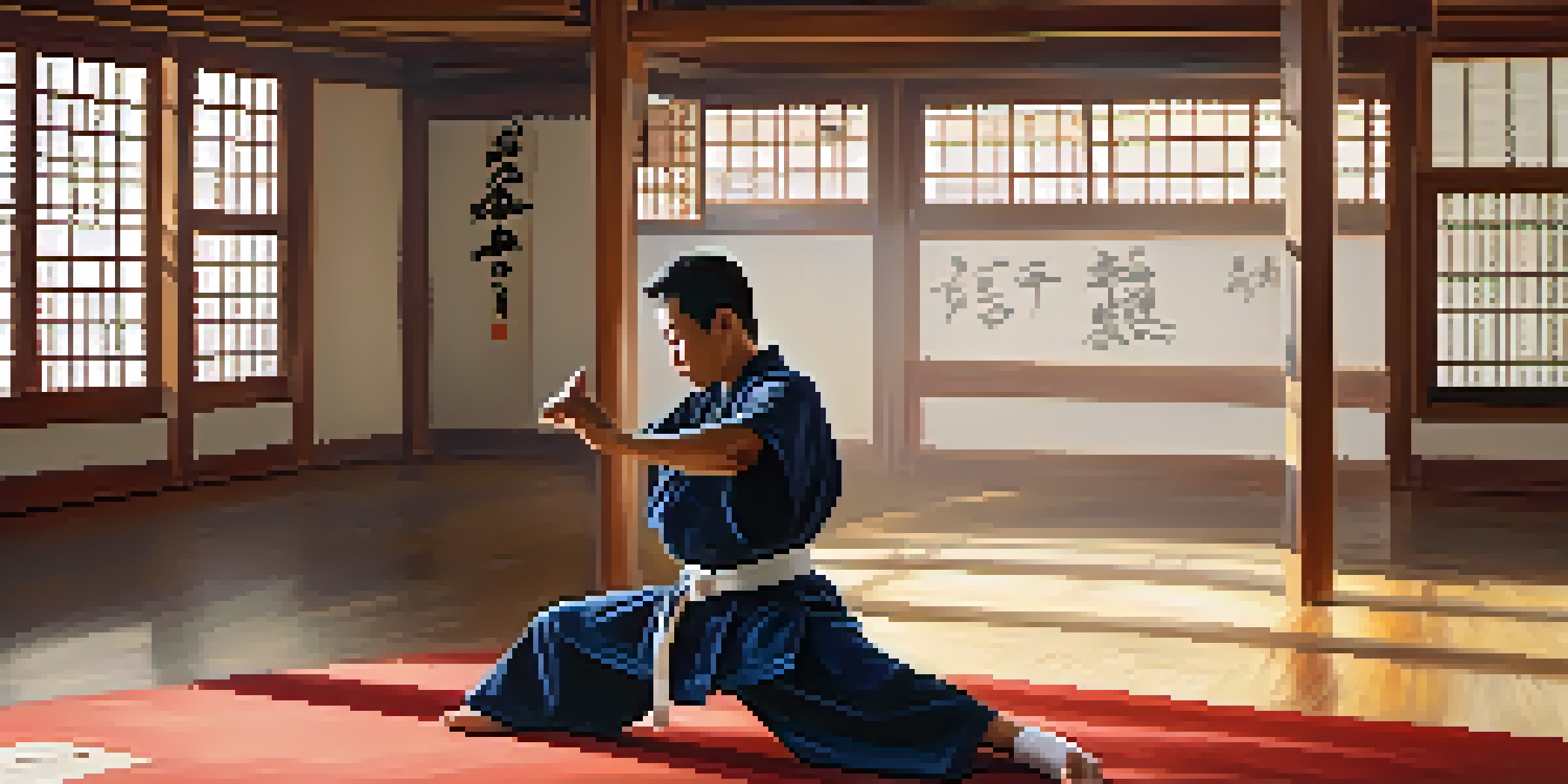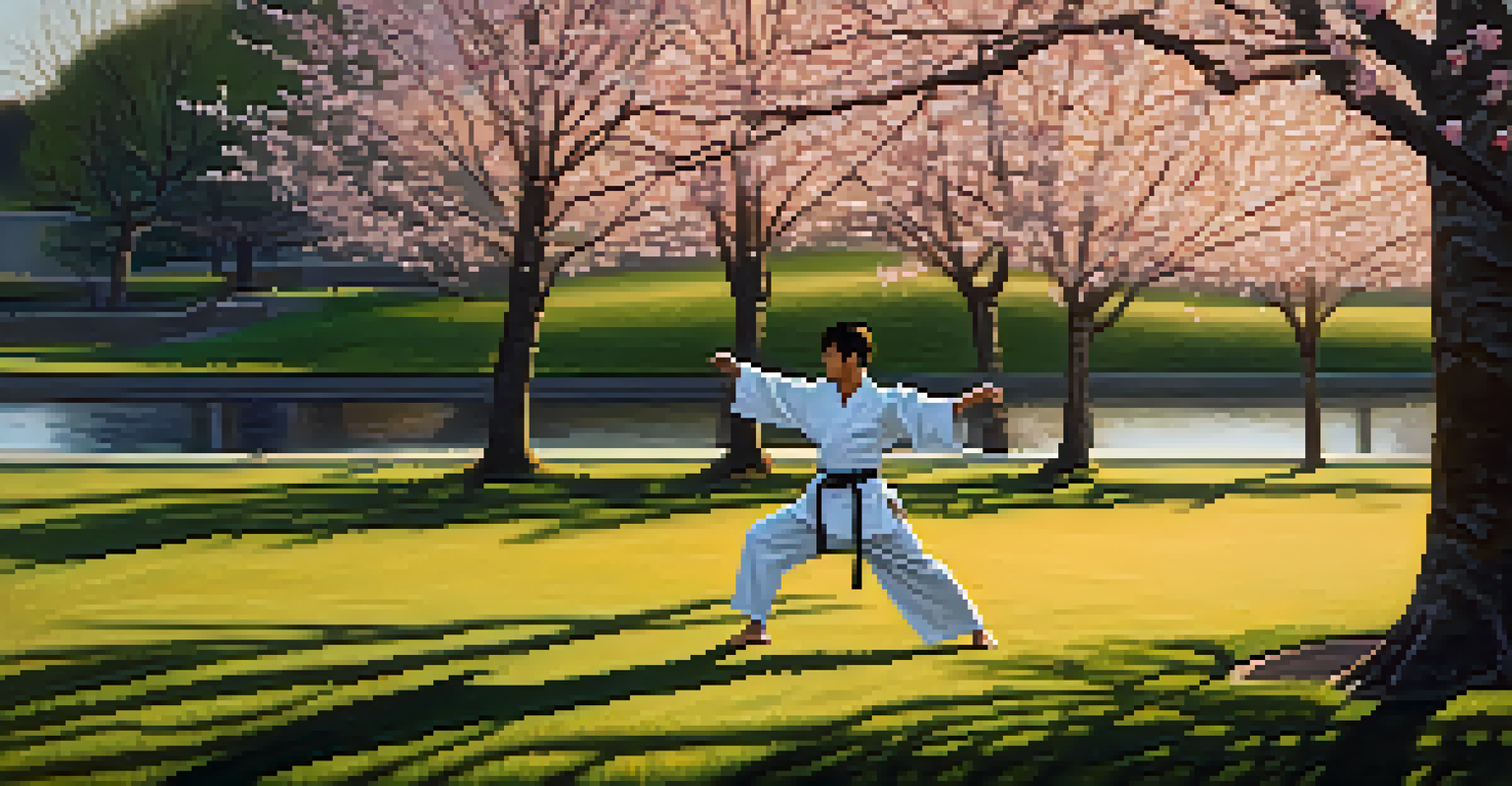Applying Martial Arts Focus to Improve Listening Skills

Understanding the Connection Between Focus and Listening
Listening is not just about hearing words; it's about understanding the message behind them. Just as martial artists train to focus their minds and bodies, improving your listening skills requires a similar mindset. Developing a keen sense of focus allows you to tune out distractions and truly engage with the speaker.
The most important thing in communication is hearing what isn't said.
When practicing martial arts, you learn to concentrate on your opponent's movements and intentions. This heightened awareness can be translated into your everyday listening habits. By consciously directing your attention, you can better grasp the nuances of conversations, making you a more effective communicator.
Moreover, martial arts emphasize the importance of being present in the moment. This principle can significantly enhance your listening ability, enabling you to absorb information without letting your mind wander. By applying martial arts techniques, you can cultivate a deeper connection with those around you.
Mindfulness Techniques from Martial Arts
Mindfulness is a core aspect of many martial arts disciplines. Practicing mindfulness helps practitioners remain grounded and focused, which is essential for effective listening. By incorporating mindfulness exercises into your daily routine, you can train your brain to be more attentive during conversations.

For instance, you might try deep breathing exercises before engaging in a discussion. This technique not only calms your mind but also heightens your awareness of your surroundings and the person speaking. Just as a martial artist prepares mentally before a match, you can prepare yourself to listen actively.
Focus Enhances Listening Skills
Developing focus, much like in martial arts, allows you to engage deeply with speakers and understand their messages.
Additionally, martial arts often include forms of meditation that help improve clarity of thought. This mental clarity can make a significant difference in how well you understand and retain information during conversations. By fostering a mindful approach, you can transform your listening skills over time.
The Art of Presence in Conversations
In martial arts, being fully present during training is crucial for safety and performance. The same principle applies to listening; being present means giving your full attention to the speaker. When you practice being present, you not only hear the words but also pick up on non-verbal cues like body language and tone.
Listening is a magnetic and strange thing, a creative force. The friends who listen to us are the ones we move toward.
Imagine a martial artist in a match, completely absorbed in their opponent’s movements. This level of presence allows for quick reactions and better decision-making. In conversations, that same level of focus can help you respond thoughtfully and appropriately, fostering a deeper connection.
To cultivate this art of presence, eliminate distractions during conversations. Put away your phone and maintain eye contact with the speaker. By mirroring the focused mindset of a martial artist, you signal that their words are valued, encouraging open and meaningful dialogue.
Practicing Active Listening Techniques
Active listening is a skill that can be honed through martial arts training. Just as you learn to anticipate your opponent's next move, you can practice anticipating the needs and emotions of the speaker. This anticipation helps you engage more fully and respond in ways that acknowledge their message.
One effective technique is to paraphrase what the speaker has said before responding. This not only shows that you are listening but also clarifies any misunderstandings. In martial arts, this mirrors the practice of assessing a situation before taking action, ensuring you are making informed decisions.
Mindfulness Improves Conversations
Incorporating mindfulness techniques from martial arts helps you remain present, fostering better listening and communication.
Additionally, asking open-ended questions encourages the speaker to elaborate on their thoughts. This fosters a more dynamic conversation, much like sparring in martial arts where both participants learn from each other. By employing these active listening techniques, you can enhance your communication skills significantly.
Developing Patience Through Martial Arts
Patience is a virtue taught in many martial arts disciplines. Learning to be patient is essential for effective listening, as it allows you to resist the urge to interrupt or jump to conclusions. By embracing patience, you create a space for the speaker to express themselves fully.
In martial arts, patience often manifests during training, where progress can be slow and requires consistent effort. Similarly, in conversations, taking your time to listen can lead to deeper insights and more meaningful exchanges. Just as martial artists understand that mastery takes time, so too should you recognize the value of patience in conversation.
Practicing patience can be as simple as counting to three before responding. This brief pause not only gives the speaker time to finish but also allows you to gather your thoughts. By developing patience, you're not only improving your listening skills but also fostering respect and understanding.
Physical Practices to Enhance Listening Skills
Engaging in physical activities related to martial arts can also improve your listening skills. Techniques such as shadowboxing or practicing forms require intense focus and coordination. By honing these physical skills, you can enhance your overall ability to concentrate, which translates into better listening.
For example, while practicing a kata, you must be aware of your body’s movements and the rhythm of the sequence. This awareness fosters a similar mindset during conversations where your focus is needed. Just as martial artists train their bodies, you can train your mind to be more attentive in discussions.
Patience Fosters Meaningful Dialogue
Practicing patience in conversations creates space for speakers to express themselves, leading to deeper insights and connections.
Additionally, incorporating movement into your listening practice, such as walking while listening to someone, can help maintain your focus. The combination of physical engagement and active listening creates a dynamic that can enhance retention and understanding of the conversation.
Building Confidence Through Martial Arts
Confidence is a key component of both martial arts and effective listening. When you feel confident in your abilities, you’re more likely to engage openly in conversations. Martial arts training instills a sense of self-assurance that can enhance your listening presence.
As you progress in martial arts, you learn to trust your instincts and make decisions swiftly. This confidence can be mirrored in conversations, allowing you to listen without second-guessing yourself. When you believe in your ability to understand and respond, you become a more engaged listener.

Building this confidence requires practice and perseverance. By taking small steps—like initiating conversations and practicing active listening—you can gradually boost your self-esteem. As your confidence grows, so will your ability to listen effectively and meaningfully.